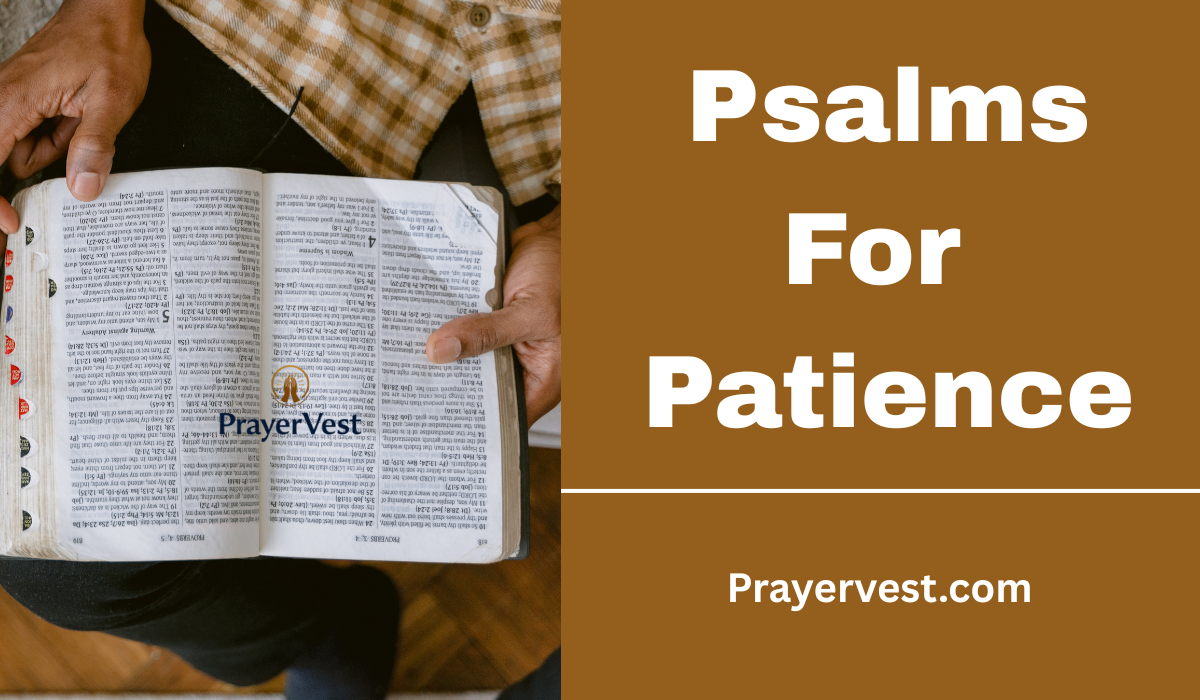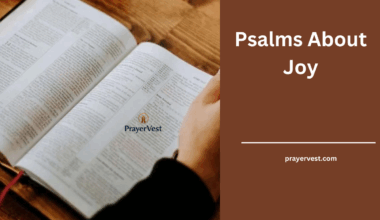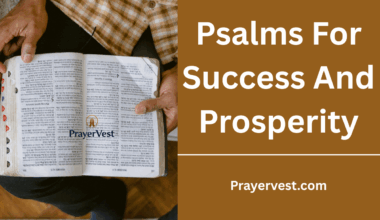Psalms for patience is a spiritual quality that is both extremely difficult and incredibly fulfilling is patience. Waiting can frequently feel like a burden in our fast-paced world of incessant demands and rapid fulfillment.
However, the Bible constantly reminds us that patience is an active confidence in God’s perfect timing and sovereign will, not only a passive state. Those times of waiting, uncertainty, and hope are given voice in the Book of Psalms, which is full of spiritual insight and emotional honesty.
We read prayers and songs from people who waited on God in the face of hardship, injustice, silence, and delay throughout the Psalms. These Psalms for patience demonstrate that patience is about developing a heart posture that rests in God’s character even when the outcome is uncertain, not just about standing the test of time.


Every Psalm teaches us that patience is frequently the soil in which faith develops greatest, whether it is through David’s concealment from Saul, the psalmists’ mourning over unfulfilled pleas, or the faithful’s cries for relief.
You will be inspired to wait with purpose, endure with grace, and trust with confidence by this compilation of 50 potent Psalms for patience. May God’s timing bring you serenity, His promises replenish your strength, and His unwavering love anchor your heart as you reflect on these lines. As you navigate times that call for divine patience, let the Psalms serve as your prayer, solace, and direction.
50 Powerful Psalms For Patience (2026)
1. Psalm 27:14
“Wait for the Lord; be strong and take heart and wait for the Lord.”
This verse is a direct exhortation to remain patient amid uncertainty. David, who often experienced long delays between God’s promises and their fulfillment, speaks from personal experience. To “wait for the Lord” is not passive; it’s an active trust, a courageous clinging to God when nothing makes sense. Strength and heart are not just needed for battle, but for waiting in faith. This verse teaches that patience is a brave spiritual discipline rooted in hope, not in circumstances.
Reflection
Patience isn’t just about enduring time—it’s about enduring with faith. Waiting tests our hearts, often exposing doubts, fears, and control issues. Psalm 27:14 invites us to wait with courage, not resignation. It’s a reminder that God is always worth the wait, and His timing is never accidental. In our moments of restlessness, we can anchor our hearts in the certainty that the One we wait for is good, sovereign, and near.
2. Psalm 37:7
“Be still before the Lord and wait patiently for him; do not fret when people succeed in their ways, when they carry out their wicked schemes.”
This verse calls for stillness and patience in the face of injustice and worldly success. When others prosper through deceit or manipulation, it’s tempting to grow anxious or bitter. Yet, David urges us to anchor our hearts in God’s presence and timing. The discipline of waiting includes a refusal to be distracted or discouraged by temporary, earthly success. Trusting God means resisting the urge to take matters into our own hands.
Reflection
Patience is most tested when we see others seemingly winning by doing wrong. But God calls us to a different way—stillness rooted in His faithfulness. Psalm 37:7 reminds us that appearances are not the full picture. The patient heart finds peace not in outcomes, but in obedience and trust. As we quiet our minds before God, we learn that His justice is perfect and His deliverance will not delay forever.
3. Psalm 40:1
“I waited patiently for the Lord; he turned to me and heard my cry.”
David reflects on a season of intense waiting that eventually led to divine breakthrough. This verse reassures us that our patient waiting is never ignored. God not only hears our cries, but He actively “turns” toward us. David’s testimony gives encouragement to those who feel forgotten—affirming that patient endurance always leads to God’s attention and movement, even if delayed.
Reflection
This verse is a powerful reminder that waiting does not go unnoticed in the heavenly courts. Though the world rushes by, God’s pace is purposeful. David’s story is our story: in patience, we are not static; we are postured for divine encounter. Keep crying out, not in despair, but in hope. God’s ear is never closed, and His heart is never far from those who wait for Him.
4. Psalm 130:5
“I wait for the Lord, my whole being waits, and in his word I put my hope.”
The psalmist expresses a deep, all-consuming patience grounded in God’s promises. This is not casual or half-hearted waiting—it is total surrender, involving every part of the soul. Importantly, the wait is anchored in Scripture. It’s not just about enduring time but about trusting the reliability of God’s Word as the foundation for enduring hope.
Reflection
True patience begins with where we place our hope. Waiting isn’t just about duration—it’s about focus. Psalm 130:5 challenges us to let our entire being rest in the promises of God. As we immerse ourselves in His Word, our waiting becomes worship. Even in the silence, even in the delay, God is forming us into people of hope, maturity, and strength.
5. Psalm 62:5
“Yes, my soul, find rest in God; my hope comes from him.”
This verse is a self-directed declaration—a reminder to the soul to remain calm and patient in God. Hope is not manufactured internally; it is received from God Himself. The call to “rest” suggests an active decision to cease striving and embrace God’s timing and sufficiency.
Reflection
In the whirlwind of life, speaking to our souls can be a spiritual strategy. Psalm 62:5 shows us that patience includes rest, and rest is an act of trust. When everything in us wants to fix, hurry, or escape, we can turn inward and whisper: “Wait on Him. Rest in Him. Hope in Him.” In this kind of surrender, we find divine peace even before the solution arrives.
h2>6. Psalm 25:5
“Guide me in your truth and teach me, for you are God my Savior, and my hope is in you all day long.”
This verse is a heartfelt request for divine direction and instruction. David’s posture is one of continual waiting—his hope in God endures “all day long.” This is the essence of spiritual patience: not just momentary trust, but sustained, long-term dependence on God’s truth and guidance. It acknowledges our need to be taught as we wait.
Reflection
Patience grows best in the soil of teachability. Psalm 25:5 shows us that part of waiting is learning—allowing God to teach us in the delays. When we long for answers or breakthroughs, God often first offers wisdom. As we fix our hope on Him, we’re not just waiting for results; we’re being shaped by revelation. This transforms the waiting room into a classroom of grace.
7. Psalm 33:20
“We wait in hope for the Lord; he is our help and our shield.”
This verse emphasizes communal, hope-filled waiting. It’s not anxious or passive, but a declaration of trust in God’s protection and assistance. In seasons of vulnerability or danger, patience becomes a shield—a powerful weapon that declares, “I trust God even now.” This verse teaches us that hope and waiting are inseparable for the believer.
Reflection
Waiting doesn’t mean weakness—it means warfare with trust as your weapon. Psalm 33:20 shows that patience is how we partner with God as our help and shield. When you choose to wait instead of worry, you’re stepping into a realm of spiritual courage. Hope isn’t wishful thinking; it’s confidence in the character of God. He always shows up, never late.
8. Psalm 69:3
“I am worn out calling for help; my throat is parched. My eyes fail, looking for my God.”
This honest cry of exhaustion captures the emotional weight of prolonged waiting. David is physically and spiritually drained, yet he continues to seek God. This verse reminds us that even in the weariness of waiting, it’s okay to admit our struggle. Patience doesn’t mean pretending everything is okay—it means pressing on even when we’re at the end of ourselves.
Reflection
God is not offended by your tired prayers. Psalm 69:3 gives voice to those who are worn thin by delays and silence. If your eyes are failing from looking for Him—keep looking. If your voice is cracked from calling out, keep calling. Even at your weakest, your persistence is a form of faith. God hears even the dry whispers of the patient heart.
9. Psalm 86:15
“But you, Lord, are a compassionate and gracious God, slow to anger, abounding in love and faithfulness.”
While this verse doesn’t directly command patience, it points us to the reason we can be patient: God’s nature. He is patient with us—slow to anger, rich in love, and faithful through all seasons. When we meditate on His patience toward us, we are empowered to show the same endurance in life and in our relationships.
Reflection
You can be patient because God is patient with you. Psalm 86:15 anchors our waiting not in willpower, but in His character. When we’re tempted to give up, snap, or lose heart, remembering who He is renews our strength. His love outlasts our struggles. Let His enduring faithfulness become your model—and your motivation—to keep going.
10. Psalm 123:2
“As the eyes of slaves look to the hand of their master, as the eyes of a female slave look to the hand of her mistress, so our eyes look to the Lord our God, till he shows us his mercy.”
This vivid metaphor communicates a deep, attentive waiting. It’s not just about duration but direction—the gaze is fixed on God, watching for His mercy to move. The patience described here is humble, expectant, and faithful. It reflects a posture of utter dependence, knowing that only God can bring the relief or intervention we seek.
Reflection
Patience is the art of watching God’s hand. Psalm 123:2 teaches us to keep our eyes up, not down—focused not on our situation, but on the One who holds the solution. In your long wait, keep your gaze locked on heaven. Mercy will come. Your job is not to control the timing but to remain attentive, surrendered, and full of hope.
11. Psalm 27:14
“Wait for the Lord; be strong and take heart and wait for the Lord.”
This verse is a powerful exhortation that repeats the call to wait on the Lord—not just once, but twice. It reinforces the idea that waiting requires inner strength and courage. Patience here is not idle but active; it’s about choosing bravery in the face of uncertainty and trusting God’s perfect timing with unwavering hope.
Reflection
Patience isn’t weakness; it’s strength under surrender. Psalm 27:14 dares you to dig deep into your faith and wait with courage. In a world that celebrates speed and immediate results, waiting on God becomes an act of radical trust. When everything tells you to panic, God calls you to be still. Hold on. Strengthen your heart. He is worth the wait.
12. Psalm 37:7
“Be still before the Lord and wait patiently for him; do not fret when people succeed in their ways, when they carry out their wicked schemes.”
This verse contrasts patient waiting with fretful comparison. When we see others seemingly advancing while we’re stuck waiting, the temptation to envy or anxiety grows. But the psalmist reminds us that true peace comes from stillness before God—not from racing to keep up with others. Trust in God’s justice is the root of patient endurance.
Reflection
Don’t measure your life by the pace of others. Psalm 37:7 calls you to stillness in a world of noise and comparison. Be still—not just physically, but mentally and emotionally. Rest your striving soul. God’s plan for you is not on anyone else’s schedule. Patience is trusting God to write your story at His pace, not theirs.
13. Psalm 40:1
“I waited patiently for the Lord; he turned to me and heard my cry.”
This verse is a personal testimony of the reward of patience. David didn’t just wait—he waited patiently, and God responded with attentiveness and mercy. It highlights the relational nature of waiting on God. Our patience is not wasted in silence; it is seen and heard by a compassionate God who responds in His time.
Reflection
Waiting feels like silence, but it’s not abandonment. Psalm 40:1 assures us that God sees every delay and hears every tear-streaked prayer. Patience is not a void—it’s a bridge to divine intimacy. As you wait, you are not being ignored; you are being drawn closer. The God who hears will act at the perfect time.
14. Psalm 62:5
“Yes, my soul, find rest in God; my hope comes from him.”
This is a personal affirmation of inner peace during waiting. The psalmist tells his soul to rest, to quiet itself in the presence of God. Hope is not found in outcomes or escape but in God Himself. This verse teaches that patience is nurtured by a restful spirit and a focused trust in the Lord as the source of all hope.
Reflection
Speak peace to your soul. Psalm 62:5 reminds us that patience begins with inner rest—not in your situation changing, but in your heart settling. Instead of obsessing over the outcome, let your soul exhale. God is your hope, not just His blessings. In Him, you’ll find the calm strength to wait with peace.
15. Psalm 130:5
“I wait for the Lord, my whole being waits, and in his word I put my hope.”
This verse speaks of total, wholehearted waiting. It’s not half-hearted or distracted but fully engaged patience anchored in God’s Word. Waiting isn’t just about time—it’s about where we place our confidence. The psalmist’s entire being leans into trust, holding onto God’s promises through the storm.
Reflection
God doesn’t ask you to wait with fragments of faith—He invites your whole self into trust. Psalm 130:5 is a model of complete surrender. Let your soul, your thoughts, and even your emotions learn to lean on His promises. When you root your hope in His Word, patience becomes worship.
16. Psalm 143:8
“Let the morning bring me word of your unfailing love, for I have put my trust in you. Show me the way I should go, for to you I entrust my life.”
This is a prayer for guidance and reassurance during an uncertain wait. The psalmist seeks daily confirmation of God’s love and direction. It shows that in seasons of waiting, we need consistent reminders of God’s presence and leading. Patience is built one morning at a time, with renewed trust each day.
Reflection
Let every morning be a reset in patience. Psalm 143:8 gives language to the waiting heart—“Show me your love today. Guide me today.” You don’t need to see the full path—just the next step. Entrusting your life to God daily cultivates deep, unshakeable patience rooted in relationship, not results.
17. Psalm 31:24
“Be strong and take heart, all you who hope in the Lord.”
This verse is an encouragement to the community of believers. It acknowledges that hoping in the Lord requires courage and strength. The patient life isn’t passive—it takes heart. Strength is not the absence of fear or frustration but the resolve to continue hoping anyway.
Reflection
Hoping is hard work. Psalm 31:24 reminds us that patience is not for the faint of heart—it’s a brave stance in a world that demands immediacy. You are not alone in your wait. Take heart alongside the others who are trusting, too. There is courage in community and strength in shared hope.
18. Psalm 5:3
“In the morning, Lord, you hear my voice; in the morning I lay my requests before you and wait expectantly.”
This verse describes an expectant posture in prayer. It shows a rhythm of bringing requests to God and then choosing to wait with hope. Expectancy is not entitlement—it is trust in God’s faithfulness. The psalmist isn’t passive after praying; he watches, listens, and believes God will answer.
Reflection
Lay it down and lift your eyes. Psalm 5:3 shows that patient waiting starts in prayer. Start your day by pouring it out to God, then stand in expectation. Don’t pick the burden back up—trust Him to respond. Expectancy isn’t about getting your way; it’s about knowing God will always do what’s best.
19. Psalm 94:12-13
“Blessed is the one you discipline, Lord, the one you teach from your law; you grant them relief from days of trouble, till a pit is dug for the wicked.”
This verse connects patience with spiritual discipline and trust in divine justice. God uses seasons of struggle to shape and instruct us, offering eventual relief. Waiting may include correction and growth, but it also brings blessing and protection. God’s timing includes justice and restoration.
Reflection
Sometimes waiting feels like discipline—and that’s not a bad thing. Psalm 94:12-13 tells us God is not punishing you; He’s preparing you. The pain of waiting may be part of the refining process. Trust that relief is coming, and while you wait, know you’re being trained for something greater than comfort—character.
20. Psalm 38:15
“Lord, I wait for you; you will answer, Lord my God.”
This verse is a bold declaration of confidence. The psalmist waits not with doubt but with certainty that God will respond. This kind of patience is rooted in deep faith—believing that even if the answer is delayed, it is coming. God’s timing is never early or late.
Reflection
Faith speaks before it sees. Psalm 38:15 invites you to declare with confidence: “You will answer, Lord.” Let that become your anthem in the waiting. Not “if,” but “when.” Patience means trusting in what you can’t yet see and standing firm on what you already know—God is faithful.
21. Psalm 37:34
“Hope in the Lord and keep his way. He will exalt you to inherit the land; when the wicked are destroyed, you will see it.”
This verse promises reward for steadfast hope and obedience. Patience here involves not only waiting, but walking rightly during the wait. God’s vindication comes in time, and those who remain faithful will receive their inheritance. The promise is not only future reward but righteous triumph.
Reflection
Stay on the path while you wait. Psalm 37:34 teaches us that patience is not passive—it walks in obedience. Don’t just wait *for* God, walk *with* Him. He will lift you. Justice may feel delayed, but it is never denied. Keep hoping, keep walking—you will see His goodness unfold.
22. Psalm 145:15
“The eyes of all look to you, and you give them their food at the proper time.”
This verse points to God’s faithful provision, always delivered at the proper time. It encourages a communal patience—“all” wait on Him—and a trust that God never forgets what we need. Patience is tied to faith in God’s provision, even when we feel empty.
Reflection
Provision is never random with God. Psalm 145:15 reminds us that His timing is perfect—even in feeding us, He waits until the moment is right. Keep your eyes on Him. What you need is already known, and it will come. Trust the One who satisfies every need, exactly when it’s needed most.
23. Psalm 6:3
“My soul is in deep anguish. How long, Lord, how long?”
This verse captures the raw cry of the discouraged heart. It reveals that even faithful people experience deep emotional struggle in waiting. Patience doesn’t ignore pain—it brings it to God in honesty. This kind of vulnerability in prayer is not weakness, but sacred intimacy.
Reflection
It’s okay to ask “how long?” Psalm 6:3 permits us to bring our anguish before God. He is not surprised by your struggle—He invites it. Honest waiting is still faithful waiting. Bring your ache to the altar. He sees, He knows, and in time, He will restore your soul.
24. Psalm 102:13
“You will arise and have compassion on Zion, for it is time to show favor to her; the appointed time has come.”
This verse is a declaration that God’s moment of favor has arrived. It reveals that divine timing is not random—it is appointed. Though we often wait in uncertainty, God’s calendar is precise. When He moves, He does so in fullness and compassion.
Reflection
The waiting will end. Psalm 102:13 declares that God *will* arise. He’s never forgotten your pain. There is an appointed time, and when it comes, favor will flow like a river. Trust that your waiting is preparing the ground for that divine moment. Don’t lose heart—you are closer than you know.
25. Psalm 10:17
“You, Lord, hear the desire of the afflicted; you encourage them, and you listen to their cry.”
This verse affirms that God listens attentively to those in distress. It comforts those who are afflicted and patiently waiting for relief. God’s response may not be immediate, but it is never absent. His encouragement sustains us while we wait for His intervention.
Reflection
Even in silence, He’s listening. Psalm 10:17 reminds us that God is not distant from the discouraged—He draws near. Every cry, every whisper of longing is heard. Let this give you courage: the God who hears is the God who answers. Patience rests in this truth—He’s already working behind the scenes.
26. Psalm 31:24
“Be strong and take heart, all you who hope in the Lord.”
This verse is a rallying cry to those who choose to place their hope in God. It acknowledges that waiting can be tiring and that strength is required to endure it. Yet the strength it encourages isn’t drawn from ourselves—it is a strength born of trusting God. When our hope is in the Lord, our hearts are fortified against despair and impatience.
Reflection
Hope fuels courage, and patience strengthens resolve. Psalm 31:24 is both comfort and command to the weary-hearted: keep hoping. The longer the wait, the more tempting it is to let go. But God sees your endurance and honors your faith. Keep your grip firm on His promises. Strength rises not from striving, but from trusting in the One who never fails.
27. Psalm 32:7
“You are my hiding place; you will protect me from trouble and surround me with songs of deliverance.”
This verse celebrates the safety and shelter found in God during times of uncertainty. Patience often involves moments when we feel vulnerable or threatened by delay. But in God, we are surrounded by deliverance—even before we see it. His presence becomes our refuge while we wait.
Reflection
When the world feels unsafe and answers are delayed, God becomes our sacred hiding place. Psalm 32:7 reminds us that patience isn’t a lonely act—it’s a protected space. The waiting room is filled with songs of deliverance even before freedom fully comes. Let God’s nearness be your comfort, and His promises your shield.
28. Psalm 34:4
“I sought the Lord, and he answered me; he delivered me from all my fears.”
Here we see the result of persistent seeking. The psalmist testifies that God not only heard but answered. This encourages us that our patient prayers are never in vain. While answers may not always come immediately, the promise is that God hears and responds in the fullness of His perfect time.
Reflection
Every cry you make in patience reaches heaven. Psalm 34:4 assures us that God responds—not just to our faith, but to our fears. He may not remove the wait, but He will deliver us from the dread that often accompanies it. The more we seek, the more His peace replaces panic. Keep seeking—your answer is forming in the unseen.
29. Psalm 35:22
“LORD, you have seen this; do not be silent. Do not be far from me, Lord.”
This verse captures the tension many feel during long periods of trial: the silence of God. Yet even in his plea, the psalmist demonstrates faith. He believes that God sees, and thus calls on Him to act. Patience here is active—it calls, cries, and keeps believing that the silence will break.
Reflection
God’s silence is never absence. Psalm 35:22 shows that even when God seems quiet, He is still the all-seeing Lord. Crying out is not a failure of faith—it is a mark of relationship. Don’t stop praying. Don’t stop believing. Divine silence often precedes divine movement. Stay near, stay expectant, and trust that God is closer than you feel.
30. Psalm 40:2
“He lifted me out of the slimy pit, out of the mud and mire; he set my feet on a rock and gave me a firm place to stand.”
This verse reflects the reward of patient endurance. After crying out in verse 1, the psalmist is finally rescued. The imagery of being lifted from a pit shows how deeply God reaches into our lowest places. Patience here is shown to result in transformation—a change of footing, from sinking to standing.
Reflection
Your patience has a destination. Psalm 40:2 is proof that waiting ends in lifting. God doesn’t just rescue; He establishes. In the mud of discouragement or delay, He hears, reaches, and plants your feet on steady ground. Keep trusting—what feels like a pit today will become your platform of praise tomorrow.
31. Psalm 42:5
“Why, my soul, are you downcast? Why so disturbed within me? Put your hope in God, for I will yet praise him, my Savior and my God.”
This verse illustrates an internal dialogue—a soul struggling with discouragement. Rather than giving in to despair, the psalmist chooses to redirect his heart toward hope in God. It takes patience to speak truth to your soul when emotions pull you elsewhere. This verse encourages spiritual perseverance even in emotional turmoil.
Reflection
Patience often begins within. Psalm 42:5 teaches us how to pause and remind our hearts that hope still lives, even when feelings fade. When discouragement clouds your soul, speak to it—redirect it toward praise. Though your present feels heavy, the “yet” of faith declares: joy is coming. Trust in God and keep praising forward.
32. Psalm 46:1
“God is our refuge and strength, an ever-present help in trouble.”
Patience often requires a sense of safety while we wait. This verse promises that God is not just present, but always present—especially in times of distress. Knowing He is a refuge gives us the calm needed to endure seasons of waiting without fear.
Reflection
Patience grows in the shelter of assurance. Psalm 46:1 reminds us that we are not alone in hardship. God is not distant or occasional—He is ever-present. When trouble stirs up anxiety or frustration, remember that God is both your hiding place and your help. You can wait in safety when your strength is in Him.
33. Psalm 55:22
“Cast your cares on the Lord and he will sustain you; he will never let the righteous be shaken.”
This verse encourages us to give our burdens to God. Patience is often weighed down by worry, but this Psalm tells us we don’t have to carry it alone. As we wait, God sustains us—not by removing the burden, but by strengthening our ability to endure it.
Reflection
The road of patience is not meant to be walked alone. Psalm 55:22 invites us to lay down our load and trust the One who sustains. The longer we carry anxiety, the heavier it grows. But when we cast our cares, God provides steady footing and internal peace. Trust that He holds your life firm—unshaken by the storms of delay.
34. Psalm 56:3
“When I am afraid, I put my trust in you.”
Waiting often brings fear—fear that things won’t change, or that we’ll be forgotten. This short but powerful verse reminds us that fear is not the end; trust is the answer. Patience and faith are inseparable, and this verse teaches us to respond to fear with intentional trust.
Reflection
Fear may visit, but it doesn’t have to stay. Psalm 56:3 offers a simple and transformative response: trust. Each time anxiety rises, make the conscious choice to believe God is in control. You don’t need to silence fear to walk in patience—you only need to redirect your heart toward trust again and again.
35. Psalm 62:1
“Truly my soul finds rest in God; my salvation comes from him.”
True patience is rooted in rest—not in passivity, but in peaceful confidence. This verse reminds us that our waiting does not need to be restless. When we recognize God as the source of salvation, we can find stillness even in long seasons of delay.
Reflection
Rest is a byproduct of trust. Psalm 62:1 shows that when our souls are anchored in God, patience becomes less about endurance and more about serenity. You don’t have to wrestle with your waiting. Rest in the God who saves, who sees, and who is never late in His arrival.
36. Psalm 62:5
“Yes, my soul, find rest in God; my hope comes from him.”
This verse continues the call to inner stillness. It moves from a declaration to a command, showing that patience often requires us to instruct our hearts. We don’t automatically rest—we choose to rest by remembering where our hope is anchored.
Reflection
Sometimes your soul needs reminding. Psalm 62:5 tells us that hope is not found in outcomes, but in God Himself. As we wait, we must teach our hearts to be still, to trust, and to hope not in what we can see, but in the One who holds the unseen. Rest doesn’t mean nothing is happening—it means you trust God is working.
37. Psalm 66:12
“You let people ride over our heads; we went through fire and water, but you brought us to a place of abundance.”
This verse recounts hardship, but also redemption. It shows that the journey to abundance is not always smooth. Patience is required when you’re in the fire and flood, trusting that God is leading you somewhere better—even when the process is painful.
Reflection
Growth takes time, and abundance often lies beyond adversity. Psalm 66:12 is an honest look at hardship, but also a testimony of divine faithfulness. What you’re enduring now may be part of a divine route to a spacious place. Be patient in the fire—God is preparing abundance on the other side.
38. Psalm 69:13
“But I pray to you, LORD, in the time of your favor; in your great love, O God, answer me with your sure salvation.”
Here, the psalmist prays in faith, believing that God’s timing—though sometimes mysterious—is perfect. Patience means waiting for God’s “favorable time,” not pushing for our own. It also means believing His love will bring the right answer in the right way.
Reflection
God’s timing isn’t random—it’s redemptive. Psalm 69:13 teaches us to wait on His favor, not just for relief. When answers delay, don’t lose faith in His love. His silence doesn’t signal absence—it may simply mean He’s preparing the best outcome. Trust that the answer will come when His love says it’s time.
39. Psalm 70:5
“But as for me, I am poor and needy; come quickly to me, O God. You are my help and my deliverer; LORD, do not delay.”
This verse is a heartfelt plea for urgency. It reminds us that asking God to hurry is not a lack of faith—it’s a sign of intimacy. Still, the psalmist affirms that even in urgency, he sees God as his help and deliverer.
Reflection
God welcomes your urgency. Psalm 70:5 shows that patience doesn’t mean passivity—it means trusting God’s character even when pleading for speed. Pour out your need honestly, but anchor your heart in the truth that He is your help. Even if His timeline feels slow, His love is always on time.
40. Psalm 71:20
“Though you have made me see troubles, many and bitter, you will restore my life again; from the depths of the earth you will again bring me up.”
This verse affirms that God’s restoration follows trouble. Patience is needed in times of “many and bitter” troubles. Yet the psalmist holds onto hope—not just for survival, but for renewal. God’s power to bring life again is greater than any descent.
Reflection
Restoration often follows waiting. Psalm 71:20 gives us hope that even the deepest losses are not the end of the story. God is not finished with you. Even if you feel buried by disappointment, He promises to raise you again. Patience allows the process of restoration to unfold—trust that new life is already forming beneath the surface.
41. Psalm 73:26
“My flesh and my heart may fail, but God is the strength of my heart and my portion forever.”
This verse acknowledges human frailty—physical and emotional—but celebrates divine consistency. In moments of exhaustion, when patience wears thin and our strength fails, God becomes our sustaining portion. He is not just a temporary helper, but our eternal inheritance.
Reflection
When your patience is depleted and your body or emotions give way, Psalm 73:26 reminds you that God doesn’t. He becomes your inner fuel, the one who steadies your trembling soul. Don’t rely on your strength to be patient—lean into the strength of the One who never fails and is forever enough.
42. Psalm 77:11-12
“I will remember the deeds of the Lord; yes, I will remember your miracles of long ago. I will consider all your works and meditate on all your mighty deeds.”
In times of waiting, memory becomes a spiritual tool. This verse shows how reflecting on God’s past faithfulness can strengthen present patience. Remembering what God has done builds confidence that He will act again.
Reflection
Your past with God is a reservoir of hope. Psalm 77:11-12 teaches us to look back as we wait forward. When your current circumstances seem slow or silent, remember what He’s already brought you through. Let past victories feed your current patience and remind you that the God who delivered you then still reigns now.
43. Psalm 84:11
“For the Lord God is a sun and shield; the Lord bestows favor and honor; no good thing does he withhold from those whose walk is blameless.”
This verse is a promise that God does not withhold good things. Sometimes patience is tested when we believe God is holding back. But this Psalm assures us that if it’s good, God will not withhold it—and if He does, it’s not the right time or not the right thing.
Reflection
Delay is not denial. Psalm 84:11 invites us to trust that God’s timing and choices are rooted in goodness. If something is being withheld, it’s because something better is being prepared. Patience, then, becomes an act of faith in the goodness of God’s heart and the wisdom of His timing.
44. Psalm 86:7
“When I am in distress, I call to you, because you answer me.”
Here the psalmist confidently declares God’s responsiveness. Waiting often feels like a one-sided silence, but this verse reminds us that God hears and answers. Calling on Him is not in vain—He is a God who responds.
Reflection
God’s silence is not indifference. Psalm 86:7 assures you that your cries are heard, your prayers are received, and answers are being formed. In seasons of waiting, don’t stop calling on Him. Your persistence is not ignored—it is the language of faith, and God always answers in perfect love.
45. Psalm 90:4
“A thousand years in your sight are like a day that has just gone by, or like a watch in the night.”
This verse puts time in perspective. What feels like forever to us is a mere moment to God. Patience requires recognizing that God’s timeline operates on a different scale—one of eternity rather than urgency.
Reflection
When waiting stretches endlessly, Psalm 90:4 offers comfort: God’s view of time is not limited like ours. What seems slow is still strategic. He sees the full picture, not just the moment. Trust that what feels delayed is perfectly timed in the hands of the eternal One.
46. Psalm 91:4
“He will cover you with his feathers, and under his wings you will find refuge; his faithfulness will be your shield and rampart.”
This comforting image of God’s protection and faithfulness invites us to rest in His care while we wait. Like a bird shielding its young, God covers us with His presence, giving us space to be still, trust, and wait patiently.
Reflection
Waiting doesn’t have to be exposed and anxious. Psalm 91:4 shows us a different way—resting under the wings of God. His faithfulness surrounds you even when answers feel far away. While you wait, you are hidden in His love and covered by His faithfulness. That alone can quiet your heart.
47. Psalm 94:19
“When anxiety was great within me, your consolation brought me joy.”
This verse highlights the tension between anxiety and divine comfort. Patience often wrestles with inner worry, but God’s presence brings consolation that transforms that anxiety into joy—even before circumstances change.
Reflection
God doesn’t just ask for patience; He provides the peace to sustain it. Psalm 94:19 reminds you that your anxious thoughts are not hidden from Him—and He meets them with tender consolation. When your mind runs wild, His joy can enter and quiet the storm, making room for trust to grow.
48. Psalm 103:13-14
“As a father has compassion on his children, so the Lord has compassion on those who fear him; for he knows how we are formed, he remembers that we are dust.”
This beautiful image of God’s compassion reminds us that God understands our human limits. He doesn’t expect perfection in patience but sees our weakness with fatherly love. His expectations come with grace.
Reflection
God’s call to patience is not harsh—it’s tender. Psalm 103:13-14 assures you that He knows your frame, your struggles, and your fears. He doesn’t condemn your frustration; He holds it with compassion. Trust His understanding, love, and know He is patient with your process too.
49. Psalm 119:71
“It was good for me to be afflicted so that I might learn your decrees.”
This verse reveals that hardship, though painful, can lead to growth. Often, patience develops in the soil of difficulty. Through affliction, we come to deeper understanding and alignment with God’s word and ways.
Reflection
Not all pain is punishment—sometimes it’s preparation. Psalm 119:71 invites you to see your struggles as a classroom where patience is taught and faith matures. What seems like a setback might be your setup for deeper wisdom. Embrace the learning hidden within the delay.
50. Psalm 130:5
“I wait for the Lord, my whole being waits, and in his word I put my hope.”
This verse is a fitting conclusion to the theme of patience. It speaks of full-bodied, soul-deep waiting—a waiting that is not empty, but filled with hope in God’s word. True patience is not passive but anchored in trust.
Reflection
Waiting with your whole being is not weakness—it’s worship. Psalm 130:5 shows us that patience is not about doing nothing, but about confidently expecting God to fulfill His promises. In your waiting, hope in His word, and let your soul rest in the assurance that He is near and faithful.
Conclusion
Being patient is more than just enduring things passively; it’s a conscious decision to have faith in God’s timing even in the face of uncertainty. The Psalms serve as a reminder that waiting is not a waste of time but rather a hallowed place where God’s faithfulness is made evident, character is honed, and trust is strengthened. These verses encourage us to focus on the One who binds everything together with perfect knowledge and love, rather than the result, when we are feeling frustrated or delayed.
May you remember that God observes your waiting and appreciates your tenacity as you reflect on these Psalms. He never forgets anyone calls on Him, and He is never late. Greater rewards, a closer relationship with God, and spiritual growth are frequently attained by patience. As you put your faith in the Lord, who creates beauty in His time, may these Psalms serve as your song in the quiet and your anchor in the waiting.






